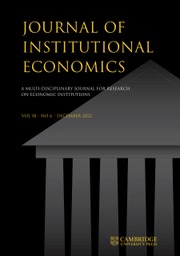-
- Get access
- Contains open access
In honour of the great critical economist Mark Blaug (1927-2011), from 2014 the Foundation for European Economic Development (FEED) is financing and awarding an annual student essay prize.
Details of the 2016 Prize Competition
Eligible essays for the prize must be critical discussions of any aspect of modern economics.
Rather than applying economics to a particular problem, eligible essays must reflect critically on the state of economics itself, as Mark Blaug did in many of his works. Critical reflections may include the assumptions adopted, the suitability of the concepts deployed, the mode of analysis, the role of mathematical models, the use of econometrics, real-world relevance, the presumed relationship between theory and policy, the unwarranted influence of ideology, the use (or otherwise) of insights from other disciplines, and so on.
The required language is English. Eligible essays are by university undergraduates, or by graduates who obtained their Bachelor’s degree no earlier than 1 January 2015. There is no residential or geographical restriction.
Undergraduate dissertations must be converted to essay format and reduced to 6,000 words (inclusive of references and appendices) or less. Author names, affiliations and email must be placed on the first page, below the title of the essay.
Up to two prizes will be awarded each year, depending on the quality of the best papers. The respective awards will be £500 and £300. FEED will reserve the right to award no prize, or one prize only, if there are inadequate essays of quality. The prizes will be judged by a committee of leading scholars.
Essays should be submitted by email to g.m.hodgson@herts.ac.uk by 1 October 2016. The awards will be made in late 2016 or early 2017.
- ISSN: 1744-1374 (Print), 1744-1382 (Online)
- Frequency: 1 volume per year
The Journal of Institutional Economics is a multi-disciplinary journal that is of interest to all academics working in the social sciences, management and law. Contributions from politics, sociology, geography, history, anthropology, psychology, law and philosophy are welcomed. The Journal of Institutional Economics aims to provide all authors with an expert verdict on their articles within fifty days of submission.



